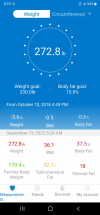LogGrad98
Well-Known Member
Contributor
20-21 Award Winner
2022 Award Winner
2023 Award Winner
2024 Award Winner
Week 0, Aug 15 - 287.0 lbs
Week 1, Aug 23 - 282.4 (-4.6)
Week 2, Aug 29 - 276.8 (-5.6; -10.2)
Week 3, Sept 6 - 274.0 (-2.8; -13.0)
Week 4, Sep 13 - 272.8 (-1.2; -14.2)
Ok week 4 was less lost as expected. I probably have burned through all the water retention and am adding some muscle. I can do my 20 pushups fairly well now, and pullups are getting easier, and I am walking more around the warehouses. Walk around a million-square-foot building a few times and you get the steps in. Generally happy with the progress, but sometimes the sugar cravings are tough. 4 weeks in, firmly in ketosis, yet the appetite hasn't diminished as much as I expected and man do I want pie. Pumpkin pie is calling to me considering we are heading to Halloween not too far off, and then Thanksgiving. But I will have allowances for stuff then. Planning a 5 day water fast the week of October 10th, that is the week my wife gets her surgery, so I am restricting my diet as she restricts hers in solidarity, but I am NOT eating pureed food. Yikes.

Edit coming on PC. It's a pain on mobile.
Edit: and it's done!
Week 1, Aug 23 - 282.4 (-4.6)
Week 2, Aug 29 - 276.8 (-5.6; -10.2)
Week 3, Sept 6 - 274.0 (-2.8; -13.0)
Week 4, Sep 13 - 272.8 (-1.2; -14.2)
Ok week 4 was less lost as expected. I probably have burned through all the water retention and am adding some muscle. I can do my 20 pushups fairly well now, and pullups are getting easier, and I am walking more around the warehouses. Walk around a million-square-foot building a few times and you get the steps in. Generally happy with the progress, but sometimes the sugar cravings are tough. 4 weeks in, firmly in ketosis, yet the appetite hasn't diminished as much as I expected and man do I want pie. Pumpkin pie is calling to me considering we are heading to Halloween not too far off, and then Thanksgiving. But I will have allowances for stuff then. Planning a 5 day water fast the week of October 10th, that is the week my wife gets her surgery, so I am restricting my diet as she restricts hers in solidarity, but I am NOT eating pureed food. Yikes.

Edit coming on PC. It's a pain on mobile.
Edit: and it's done!

